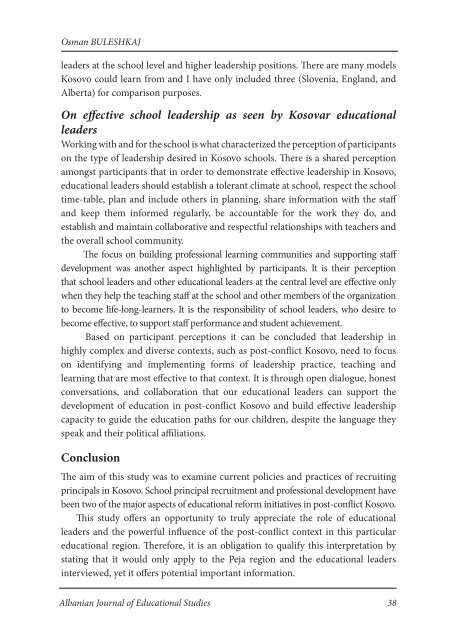Download - qendra per arsim demokratik
Download - qendra per arsim demokratik
Download - qendra per arsim demokratik
Create successful ePaper yourself
Turn your PDF publications into a flip-book with our unique Google optimized e-Paper software.
Osman BULESHKAJleaders at the school level and higher leadership positions. There are many modelsKosovo could learn from and I have only included three (Slovenia, England, andAlberta) for comparison purposes.On effective school leadership as seen by Kosovar educationalleadersWorking with and for the school is what characterized the <strong>per</strong>ception of participantson the type of leadership desired in Kosovo schools. There is a shared <strong>per</strong>ceptionamongst participants that in order to demonstrate effective leadership in Kosovo,educational leaders should establish a tolerant climate at school, respect the schooltime-table, plan and include others in planning, share information with the staffand keep them informed regularly, be accountable for the work they do, andestablish and maintain collaborative and respectful relationships with teachers andthe overall school community.The focus on building professional learning communities and supporting staffdevelopment was another aspect highlighted by participants. It is their <strong>per</strong>ceptionthat school leaders and other educational leaders at the central level are effective onlywhen they help the teaching staff at the school and other members of the organizationto become life-long-learners. It is the responsibility of school leaders, who desire tobecome effective, to support staff <strong>per</strong>formance and student achievement.Based on participant <strong>per</strong>ceptions it can be concluded that leadership inhighly complex and diverse contexts, such as post-conflict Kosovo, need to focuson identifying and implementing forms of leadership practice, teaching andlearning that are most effective to that context. It is through open dialogue, honestconversations, and collaboration that our educational leaders can support thedevelopment of education in post-conflict Kosovo and build effective leadershipcapacity to guide the education paths for our children, despite the language theyspeak and their political affiliations.ConclusionThe aim of this study was to examine current policies and practices of recruitingprincipals in Kosovo. School principal recruitment and professional development havebeen two of the major aspects of educational reform initiatives in post-conflict Kosovo.This study offers an opportunity to truly appreciate the role of educationalleaders and the powerful influence of the post-conflict context in this particulareducational region. Therefore, it is an obligation to qualify this interpretation bystating that it would only apply to the Peja region and the educational leadersinterviewed, yet it offers potential important information.Albanian Journal of Educational Studies 38


